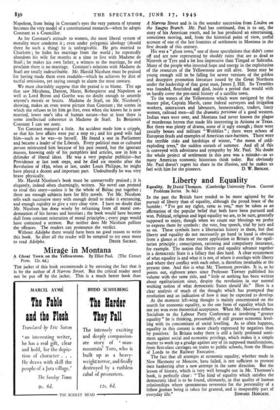Mirage in Montana
A Ghost Town on the Yellowstone. By Elliot Paul. (The Cresset Press. 12s. 6d.)
THE jacket of this book recommends it by stressing the fact that it is by the author of A Narrow Street. But the critical reader need not be put off by the jacket. This is a much better book than
A Narrow Street and is in the sounder succession from Linden on the Saugus Branch. Mr. Paul has continued, that is to say, the story of his American youth, and he has produced an entertaining, sometimes moving, and, from the historical point of view, useful account of one of the last frontiers of settlement in Montana in the first decade of this century.
His was a" ghost town," one of those speculations that didn't come off and are now represented by shoddy ruins that are as dead as Nineveh or Tyre and a lot less impressive than Timgad or Sabratha. Many of the people who invested hope and energy in the exploitation of the resources of the Yellowstone are still alive. Some may be young enough still to be falling for newer versions of the golden and deceptive promotion literature issued by, the Great Northern under the leadership of that great man, James J. Hill. So Trembles was founded, flourished and died, inside a period that would with us hardly cover the pre-natal history of a satellite town.
To the waters of the Yellowstone which were navigated by that -master pilot, Captain Marsh, came federal surveyors and irrigation workers, contractors and labourers, homesteaders, traders, fancy women, railroad men—all the dramatis personae of a good western. Indian wars were over, and Montana had never known the plague of murderous heroes that made life interesting in Arizona or Texas. But there was plenty of drama, some of it ugly enough ; there were rascally bosses and militant " Wobblies " ; there were echoes of European feuds and examples of American race-barriers. There were the terrible risks and hardships of winter, " the moon of cold- exploding trees," the sudden onrush. of summer. And all of this is conveyed with adroitness and sympathy by Mr. Paul. No doubt the whole project of settlement in this area was a mistake—as so many American economic historians think today. Bur obviously Mr. Paul doesn't regret his share in the illusion, and he makes us






































 Previous page
Previous page